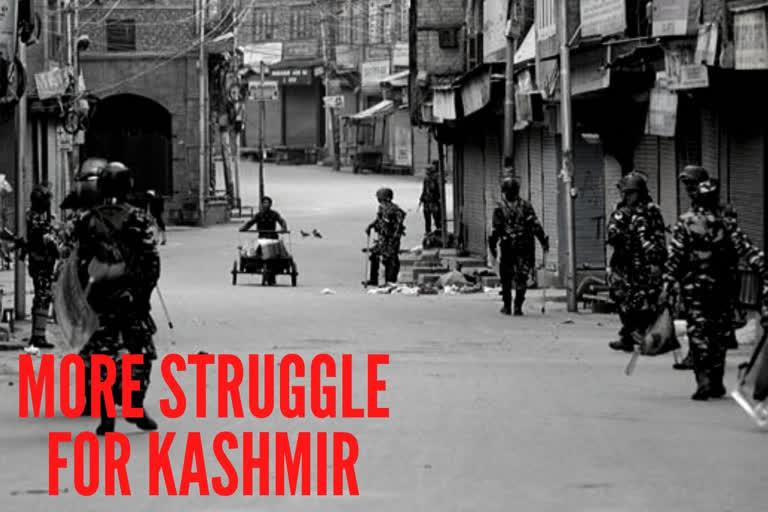Hyderabad: As India moves towards military theatre commands from its existing functional command set-up, strong justification may soon emanate for a separate theatre command for Kashmir, in the backdrop of the changed reality after the American withdrawal from Afghanistan takes place months from now.
According to military sources, a separate command for Kashmir is already being contemplated in the ongoing theatre command effort led by Chief of Defence Staff General Bipin Rawat.
The Kashmir theatre will have a unified structure that will have both army and IAF assets including force multipliers like attack helicopters, fighter aircraft, and heavy calibre artillery guns, for in the times to come, India will need all it can field to fight forces of terror in Kashmir.
The reverberations of a US withdrawal from Afghanistan will be strongly felt in Kashmir, which may see more violence, become more unsettled and insecure. This will be because well-trained and battle-hardened foreign fighters will be sought to be pushed into Kashmir under the active support and guidance of Pakistan.
This will happen primarily because Pakistan will be left free to focus on its eastern front (which is with India) as the western front facing Afghanistan will most likely have a friendly Taliban government in Kabul. Even at this point of time, the Taliban controls at least 70 per cent of the territory in Afghanistan.
“It is just a question of time now when Taliban assumes power in Kabul which means Pakistan will have an upper hand. Therefore, Pakistan’s emphasis on its western front will reduce. The ISI (Pakistan secret agency) will be able to control and guide the movement of fighters towards India and Kashmir in a far more effective manner. So, troubles in Kashmir will increase,” says Brigadier CS Sandhu (retired), former director, former Research and Analysis Wing (RAW), India’s external intelligence agency.
In its west, Pakistan is battling certain extremist groups under Operation ‘Zarb-e-Azb’ which has now been replaced with Operation ‘Radd-ul-Fasaad’. Pakistan will, therefore, be able to totally focus its energies on its eastern front with India. And with thousands of jobless mercenaries, finding fodder for a 'jihad' in Kashmir will be very easy for Pakistan.
It is an open secret that the Pakistani deep state enjoys a very close rapport with the Taliban to the extent that a Taliban-led government can be considered as an extension of the Pakistani deep state in its western frontier.
Read:| British-era Girder bridge fails to find place on Kerala's tourism map
Afghanistan is already home to lakhs of fighters belonging to various militias either owing allegiance to religious sects or to ethnic groups.
All this while, with President Ghani’s waning stature, India may have to lay its bets on Abdullah Abdullah, a Tajik, who is an important leader of the Northern Alliance which has been actively backed by Iran.
But with India-Iran ties having recently soured due to India yielding to US pressure not to buy oil from Iran, it is a fair guess how far Abdullah Abdullah will go to accommodate Indian concerns.
Says Kumar Sanjay Singh, who teaches contemporary history at Delhi University: “Iran has a big advantage of having at its beck and call about 10,000-20,000 Shia-Hazara fighters that it had trained to fight in Syria. These fighters are now back in Afghanistan and with their presence can bolster Iranian influence in Afghanistan.”
“Significantly, of late, Iran has been very critical of New Delhi’s moves in Kashmir especially on the issue of abrogation of Article 370 that accorded special status to Jammu and Kashmir. Iran’s influence on the Kashmiri Shias of Kargil and Budgam is considerable.”
“Moreover, the Bakarwals—nomadic sheep-rearing Shias—and often of critical help to the Indian establishment by being the ‘eyes and ears’ in the high-reach border areas may not be as forthcoming in their help,” adds Singh, a keen follower of developments in central and west Asia.
In fact, the latest negotiation process in Afghanistan is Pakistan-sponsored. Without doubt, India’s diplomatic plan to reduce the influence of Pakistan and the Taliban in Afghanistan has received a definite setback.
Undoubtedly, the US is in a hurry to leave the never-ending conflict in Afghanistan—a land of hardy people in a rugged land called the ‘Graveyard of Empires’. Having suffered immensely in terms of men, material and big money since 2001 when it started the ‘war against terror’, a favourable public opinion is vital before the US presidential polls in November 2020. An ‘honourable exit’ can be a veritable talking point for President Trump before and during the polls.
On Saturday, a historic pact inked in Doha between the US with its sworn enemy—the Taliban—is providing much-needed succour to US troops stationed in Afghanistan. It will cut down US presence to zero subject to certain conditions laid down in a matter of months.
But that is only the first stage of the negotiations.
The second stage of intra-Afghan negotiations is expected soon between the Taliban, the President Ashraf Ghani-led government in Kabul, and the many other non-state actors.
Both these negotiation processes is a commentary of Pakistan’s influence that will serve to enhance the country’s standing due to its ability to enable and facilitate talks. After all, the Pakistani deep state had always kept very cordial relations with the Taliban as a ‘strategic hedge’ to maintain control over Kabul once the US exits. That plan is being executed now. But in the process, it will be Kashmir and India that may bleed.



